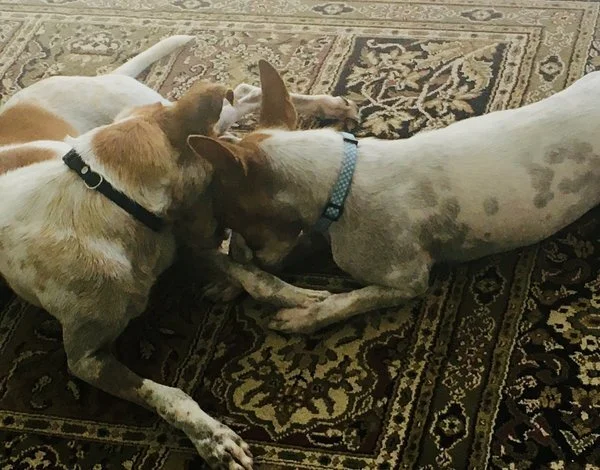My "revolting dogs" and what they mean for your leadership.
Two weeks ago, we adopted two rescue dogs. They had been rescued from a situation where they were neglected and terribly physically abused. The six-year-old has missing front teeth, presumably from being hit, and is covered in scars. The 18-month old is his scrappy little defender. They both frighten easily.
Since joining our home, such a short time ago, they have made amazing progress. They have learned their names, managed to be house-trained, have (mostly) learned which areas of the house are out-of-bounds, and are settling into a routine. They come and keep me company in my office, and love to have a snuggle and belly rub.
They also have some issues. Serious issues, as you might expect, given their background. When they are frightened, they can go from zero to 100 in a heartbeat, skipping the usual doggie warning signs and moving straight to aggressive snarling and barking. They must have learnt over their lives that they need to do this to avoid harm. We are working with a great vet and a dog trainer to help them settle this behaviour. So, when we are out with them they are mostly calm, but we keep them on a short lead and make sure people don’t loom in for a pat; mindful of keeping people safe.
This morning they were sitting quietly under an outdoor table at a cafe (on leads) while my daughter and I were having breakfast, as they have done the other two times we’ve taken them there. Towards the end of our meal, a man walked past and must have frightened them (quite unintentionally). They began to bark and leap around trying to warn him away. We apologised and explained briefly, he smiled in sympathetic understanding and went on his way.
Then, a woman pulled up in her car and got out – also perfectly reasonable – but the dogs were still at 100% and barked loudly at her as we worked to calm them. As she walked past, she said “What revolting dogs”, upsetting my daughter greatly (and me, somewhat, too).
This got me thinking.
In psychology, there is this idea of “dispositional attribution” versus “situational attribution”.
• If someone else does something wrong, such as not indicating at a roundabout, for example, we can tend to attribute it to their disposition - to who they are. “Bad driver”. “Idiot”.
• But if I fail to indicate at the roundabout, I’m more likely to attribute it to the situation. “I’m a good driver … I was just distracted”.
The woman this morning saw the dogs behaving in an unacceptable way. She attributed it to their disposition: they are revolting dogs. I would hope, though, that had she known a little more of the context, or even just taken a moment to consider that there might be more to the situation than she was privy to, that she might have held her judgment a little more lightly.
(Similarly, I might - ok, I did… at least at first - view her as a judgmental and unpleasant woman based on my interaction with her, whereas she may well be kindly and loving most of the time. I’m certainly not immune to this.)
So what does this have to do with your leadership?
It’s rare for someone to think of themselves as a poor leader, but a lot of people seem to have terrible bosses.
When we demonstrate poor leadership behaviours (such as being curt or unavailable, for example), we use situational attribution: “I’m a good leader, but at the moment I’m just tired/under pressure/sick/overworked”. It’s worth remembering that it’s likely those around you are seeing the behaviour and thinking ‘bad leader’.
Bear that in mind. You will need to keep the behaviour in check, and/or provide context to help people understand and take a broader view. Note, this doesn’t excuse poor leadership behaviour any more than I’m excusing the dogs’ barking – it just sets it in a wider context so everyone can take a broader perspective.
On the flipside, judging can feel good in the moment, like a little hit of something addictive (“I’m better than them”). But, we are actually likely to form a healthier relationship with the people and world around us if we are able to hold more nuanced and complex views about systems, situations and our place in them (“The way I’m being micromanaged on this project is not ok, although I see why my boss feels the need to do it with the pressure from head office”).
You can and should have healthy boundaries, of course, but we just plain old feel better – and are more likely to be able to address problems effectively - when we can acknowledge, live and work with the complexity that exists.
Madeleine Shaw
I work with clients from executive leadership teams to the front line, helping them to make clearer decisions about what they want, and adapt faster and more easily to change and transition. I use deep purpose as a key to unlock powerful thriving in work and life.
1. Follow me on LinkedIn to stay connected.
2. Click here to read more about my Out of the Quicksand Program, which helps you find authentic ways to expand your repertoire of skills at work.
3. Join my list to receive regular articles and insights, early news about programs and offers, and respect for your inbox.
4. Want to find out more? Send me a note and let me know.
4. Prefer to talk? Choose a time and it will drop right into my schedule.

